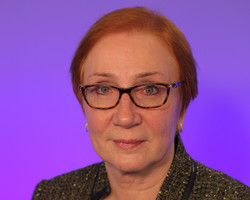Breathing easier: tobacco control progress in the Russian Federation

Galina Sakharova
Interview with Professor Galina Sakharova
The Russian Federation used to have one of the highest levels of smoking prevalence in the world. However, year after year, things are changing. Professor Galina Sakharova has been at the forefront of the fight against tobacco for more than 20 years, and is being honoured as one of WHO’s tobacco control champions in 2019. In an interview, she explained how the situation in her country has turned around since 2013 and what new challenges lie ahead.
In 2013, Professor Sakharova helped to develop a new federal law on tobacco control for the Russian Federation, which was hailed as one of the most comprehensive in the world. Since its introduction, Professor Sakharova has seen attitudes towards tobacco in the country change significantly.
Smoke-free public spaces are now commonly appreciated, even by smokers themselves. Professor Sakharova notes, “Almost everyone believes that tobacco is a product that should have restricted access due to its harmful impact on health.” This is remarkable, considering that just 10 years ago 39.1% of the Russian population were smokers according to the Global Adult Tobacco Survey.
The country’s reduction in prevalence of smoking and the change in attitudes towards tobacco are a testament to the unrelenting hard work of Professor Sakharova and others. Nonetheless, she says that a decrease in prevalence should not obscure the challenges ahead. Professor Sakharova points out that the share of smokers with a high degree of nicotine dependence is growing, and that the addiction of some is so strong they require medical assistance to quit.
Nicotine dependence has thus become Professor Sakharova’s most recent area of focus. As an inevitable consequence of tobacco use, she sees it as the major driver of smoking. Her work in this area culminated in her involvement in the development of clinical guidelines for the treatment of nicotine addiction, which the Russian Minister of Health approved last year.
This crucial work also addresses the misperception that smokeless tobacco products, such as electronic cigarettes used for vaping, are safer than cigarettes. To galvanize progress in this campaign, Professor Sakharova points out that the high prevalence of health workers who use tobacco products should be addressed, including through serious training in tobacco cessation.
Professor Sakharova says that putting lung health high on the agenda for this year’s World No Tobacco Day represents an excellent opportunity to inform people, particularly smokers, of the gravity of the situation. Smokers often brush off coughs as a harmless or minor consequence of smoking, when in reality they can signal something far more serious. By educating people around the world that coughs can be the first indicator of serious lung diseases, interventions can be made sooner.
Though much work remains to be done in the Russian Federation, the tides are turning on tobacco use. This is thanks to the commitment of the country’s leadership to health, and to the resilience of researchers and tobacco control specialists like Professor Sakharova.



